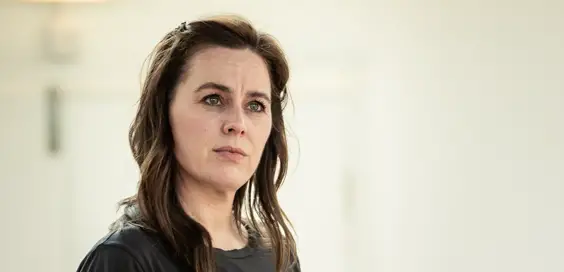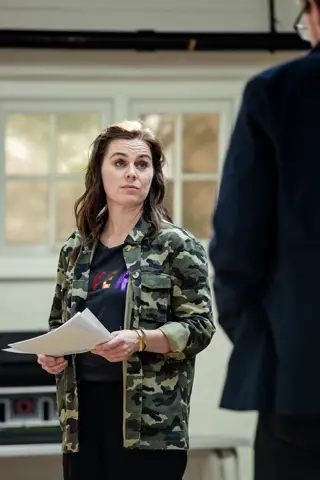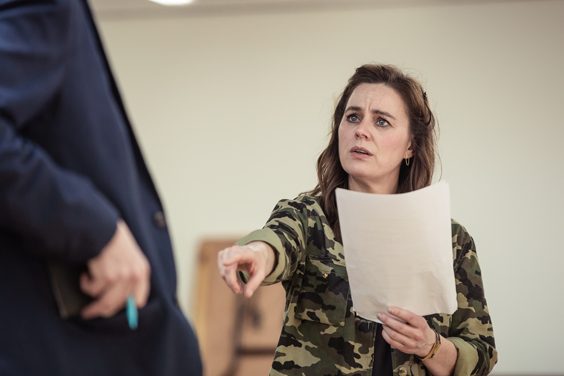An Interview with Jill Halfpenny on ‘The Girl on the Train’

The world premiere of The Girl on the Train plays at West Yorkshire Playhouse this June, the first stage production of Paula Hawkins’ riveting best-selling novel adapted by Rachel Wagstaff and Duncan Abel.
Taking the lead role of Rachel Watson, the disillusioned commuter who finds herself as a suspect in an extraordinary mystery, is television and stage star Jill Halfpenny, best known for leading roles on stage in Abigail’s Party, Chicago and Legally Blonde in the West End and television including Three Girls (BBC) and Liar (ITV).
Jill is making her West Yorkshire Playhouse debut with The Girl on the Train, joining an excellent cast and creative team including Old Vic Associate Director Joe Murphy (Woyzeck, Old Vic) who is directing the production.
Paula Hawkins best-selling novel gripped the nation, were you familiar with the story?
At first I hadn’t read the book or watched the film, but I’d obviously heard a lot about the story. When I read the script I loved how it felt like a psychological thriller on the surface, but with a really interesting portrait of a woman dealing with addiction, loss and pain underneath – in trying to solve the mystery she finds the truth out about herself. I then read the book and loved it, feeling even more excited about what the adapters, Rachel Wagstaff and Duncan Abel, were creating on stage.
“Loved the complexity of the character”
For audiences who know the book or the film, how does the stage version differ?
Our version is Rachel’s world, whereas in the book the story is told through multiple characters perspectives. The audience experience what Rachel experiences, with the whole story told from her point of view. By telling the story in this way, I think audiences will feel really on board with Rachel’s journey, starting at a point where she’s confused, scared and unable to piece together her own life, before then starting to join up the dots of the mystery.
What attracted you to the role of Rachel, and how are you approaching bringing her character to life on stage for the first time?
When I first read the script I absolutely loved the complexity of Rachel’s character. She’s striven for the perfect life, a perfect house, husband, job and family. But, when we meet her at the start of the play she’s at rock bottom, divorced, being evicted from her flat, and struggling with an alcohol addiction. She’s completely stripped bare having lost everything, seemingly at her most vulnerable, and that’s when she starts to find out who she is.

As the plot develops she takes control, realising she can live her life and be happy without having to live up to those ideals. I think telling Rachel’s story on stage now is so timely and relatable. We’re always trying to paint and present the perfect picture of ourselves, consuming the idea of a perfect life and perfect appearance through the media, and curating and projecting that ‘best’ side of ourselves on our own social media. I think audiences will really be able to relate to that side of Rachel’s character.
“We’ve all experienced jealousy, regret, and hurt”
Are you looking forward to performing at West Yorkshire Playhouse? How do you think Leeds audiences will react to the production?
I can’t wait to perform at West Yorkshire Playhouse and I think Leeds audiences are going to love the show. Not only is it such a brilliant thrill ride, but the characters’ journeys are so universal everyone watching the show will be able to recognise their struggles – we’ve all experienced jealousy, regret, and hurt which the characters go through to find the truth of their situations.
You’ve had such a varied career, do you prefer acting for stage or screen?
I don’t have a preference, I’ve always loved working on all different kinds of projects, and in all cases I’m drawn into a role by a script. If a script is brilliant and the story is captivating I’m hooked in. This is the exact process I went through with The Girl on the Train. When I read the script I found the story so compelling. Not only because of its pure thrill, but also the complexity of the characters, its occasional moments of humour, and its humanity and relatability. Audiences are really going to love it.
images: Richard Davenport










